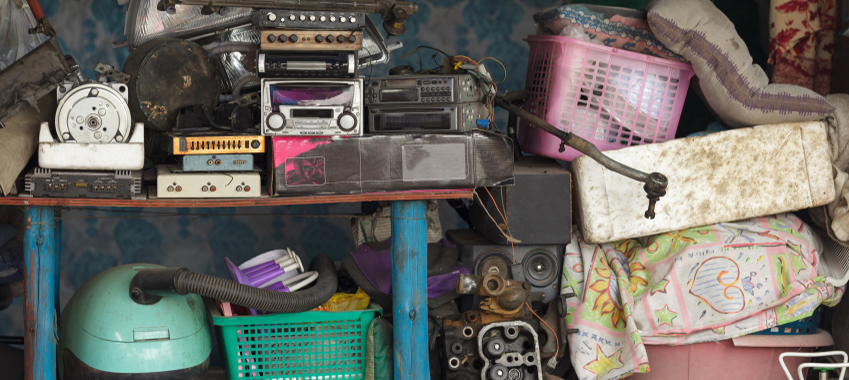It’s easy to get attached to possessions—even to the stuff that ends up getting shoved to the back of our closets or placed into junk drawers never to be seen again. Outdated or non-functional electronics, furniture that serves no current purpose, clothing that’s not right for various reasons, weird gifts from holidays long past, dust-collecting hobby or craft supplies purchased with good intentions, miscellaneous billing statements, knick-knacks, and other similar treasures have a way of hanging around long past any potential usefulness.
One of the primary reasons people keep extraneous stuff around is that they feel they may be able to use the items again someday, or that they haven’t gotten enough value out of a given item yet. If this sounds familiar, keep in mind that hanging onto items can have some costs you haven’t thought through.
1. Keeping Stuff Requires Paying for Space to Store It
If you rent storage space, it’s obvious that there’s a monthly cost involved, but not everyone does the math on whether it’s actually worth it to store their possessions. If you pay $50/month for a storage unit, you’re paying $600 per year for the privilege of continuing to own the items you’ve stored there—meaning that if the items you’re keeping there aren’t collectively worth at least twice that, you’ll soon be paying more to store the items than you would to pay to replace them as needed.
Similarly, if you’re paying $800 per month to rent a 1,000-square-foot apartment, fully one quarter of which is filled with clutter, you’re effectively paying $200 per month, or $2,400 per year to house possessions you may not care all that much about. This is particularly true if you actually have a spare bedroom or den that you’re mainly using as a dumping ground.
2. Keeping Stuff Can Cause Mental Clutter
Living in a cluttered environment can take a toll on your mental health. An over abundance of objects piled up within view can leave you feeling distracted, unsettled, and generally unable to focus.
Erin Doland of The Unclutterer compares clutter to a tantruming toddler. “Even though you might be able to focus a little, you’re still aware that a screaming toddler is also vying for your attention,” she says. “The annoyance also wears down your mental resources and you’re more likely to become frustrated.”
Knowing that you have “unfinished business” in the form of a ton of decisions to make about what to do with the mess can really weigh you down.
3. Your Favorite Items May Get Lost in the Crowd
This is particularly true of overstuffed closets and dresser drawers. When you have so many clothing options that individual pieces are jammed tightly together, you can’t easily see what you have, and it’s easy to forget about favorite outfits entirely.
“Closets are full of stories, and we need to get rid of most of them,” says Stasia Savasuk, author of the blog Thrift Me Pretty and founder of Stasia’s Style School. Savasuk notes that many Style School students actually feel like they have more clothes after they get rid of half their closet or more, simply because they can easily locate the pieces they really like.
The same principle can apply to overly full kitchen cabinets and pantries, craft areas, and bookshelves. Sometimes less really is more.
4. You May Spend Lots of Time Searching for Misplaced Essentials
When every surface is covered in a litter of random objects, it’s easy to lose things, including essential items like your keys, phone, and wallet. Important paperwork, such as bills that need to be paid, may also get lost in the shuffle, with potentially disastrous consequences.
If you spend even five minutes, two or three times a day, turning your house upside down looking for something, that translates into 60 to 90 hours per year.
5. Your Stuff Can Deprive You of Opportunities for Adventure
You may or may not want to travel the world with all of your possessions folded into a single backpack. But even if you have no plans to slow travel through Europe or take advantage of the low cost of living in Thailand, keeping your living space relatively spare and clutter-free can make it easier to list it on AirBnB if you want to rent it out to defray expenses while you take an extended vacation.
6. You Might Be Keeping Stuff From Those Who Will Happily Use It
A great way to combat the guilt that can come from not feeling like you’ve gotten enough value out of an item is to think about how to maximize the remaining value an item has left. When you’re honest with yourself, if you know that a given item is likely to sit unused for the foreseeable future, the best way to get value out of the item may be to sell or give it to someone who will love it and use it. If you’re hoping to sell the item, there’s no time like the present—most things lose most of their resale value after two or three years have passed.
Need a Donation Pickup? Get an Up-front Price.
Dolly helps you move on your schedule and at an affordable price. Book now and see the difference: https://dolly.com.


